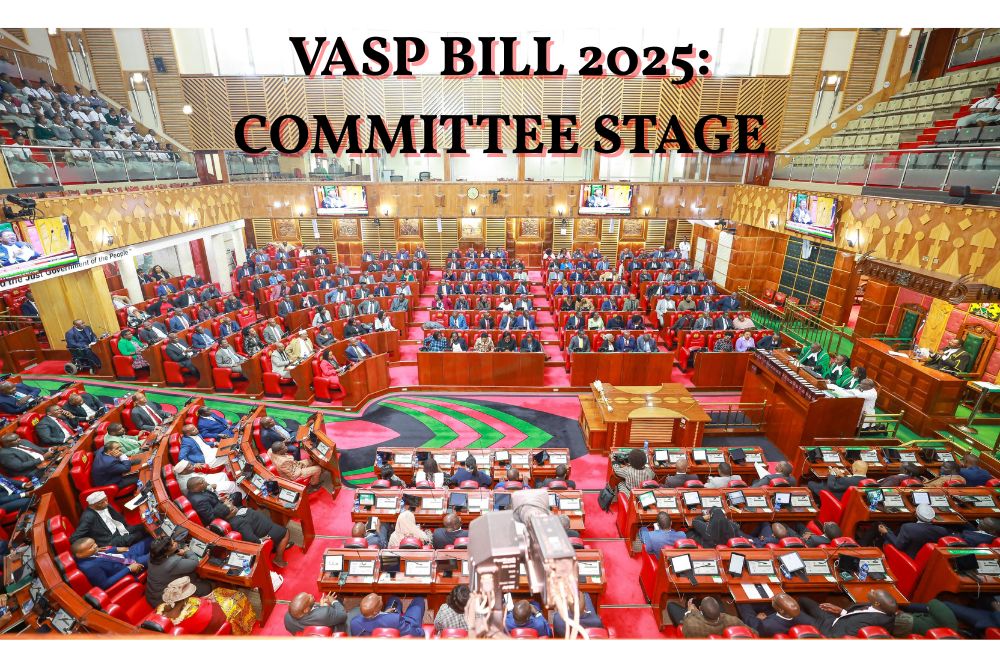
NAIROBI, Kenya – October 6, 2025.
Kenya has taken another major step toward formalizing its digital asset market. On Thursday, October 2, Members of Parliament advanced the Virtual Asset Service Providers (VASP) Bill, 2025 through the Committee of the Whole House; the stage where MPs debate, amend, and approve each clause before the Bill proceeds to final reading.
Once enacted, the Bill will create a comprehensive licensing framework for crypto exchanges, stablecoin issuers, tokenization firms, and cross-border payment providers, a move expected to reshape how digital finance is regulated and supervised in Kenya.
From Grey Zone to Regulated Space
For years, Kenya’s digital asset ecosystem has operated in a regulatory vacuum. Startups offering wallet, trading, or remittance services have relied on self-regulation, with limited oversight from financial authorities and the VASP Bill aims to change that.
Under the new framework, digital asset businesses will be required to obtain licenses from the Capital Markets Authority (CMA), the Central Bank of Kenya (CBK), or another regulator designated by the Treasury Cabinet Secretary.
The Bill defines “virtual assets” broadly, covering cryptocurrencies, tokenized assets, and digital representations of value used for payment, investment, or exchange.
Categories under the licensing regime include:
- Virtual Asset Wallet Providers – offering custodial storage for digital currencies
- Exchanges and Payment Processors – converting between crypto and fiat or enabling crypto payments
- Trading and Settlement Platforms – facilitating the clearing of digital transactions.
- Virtual Asset Managers and Advisors – managing portfolios or offering investment advice.
- Stablecoin and Token Issuance Platforms – creating or distributing tokenized assets.
- Brokers and Investment Firms – connecting buyers and sellers in the virtual asset space

Why Is This Important for Cross-Border Payments?
The Bill’s most immediate impact will be on cross-border and on/off-ramp providers who bridge the gap between crypto and fiat systems.
Once operational, these entities will be treated much like licensed financial institutions, subject to fit-and-proper tests, capital adequacy requirements, and AML/CFT compliance.
For platforms like YoguPay, which facilitate international remittances and settlements, the framework offers long-awaited clarity. With regulatory recognition, licensed VASPs could gain access to formal banking rails, easing integrations with banks, payment service providers, and international partners.
Analysts say the Bill positions Kenya to become a regional leader in regulated digital payments, allowing compliant players to operate transparently and connect with global systems under recognized standards.

How Does the Bill Address Governance and Compliance?
The Bill emphasizes strong governance as the foundation of trust in virtual asset markets.
All licensed firms will need:
- At least three natural-person directors and a regulator-approved CEO
- A registered office in Kenya
- Proper segregation of client and company funds
- Annual audited reports filed within three months of year-end
- Immediate reporting of cyber breaches, ownership changes, lawsuits, or insolvency risks
Directors and senior officers will undergo fit-and-proper assessments evaluating their integrity, competence, and financial standing. Each director may serve on a maximum of two VASP boards, to prevent concentration of control across competing entities.
These measures reflect a broader shift toward risk-based supervision, aligning with frameworks used in traditional finance.

What Are the Licensing Requirements, Fees, and Timelines?
Licensing and application fees will be prescribed in future regulations, but all licenses will expire on December 31 each year, requiring annual renewal. This mechanism ensures continuous compliance checks and updated disclosures, mirroring the structure applied to banks and insurance firms.
The Treasury Cabinet Secretary, alongside regulators like CBK and CMA, will issue implementation guidelines after the Bill’s passage, outlining fee structures, capital thresholds, and operational standards.
What Does It Mean for Startups and Crypto Exchanges?
For businesses dealing with digital assets, the new regime introduces both compliance costs and legitimacy. Startups will face higher entry barriers, from local presence requirements to governance overheads, but in return, they gain legal recognition and regulatory certainty that could attract institutional investment and partnerships.
Centralized exchanges, particularly those serving Kenyan users from offshore jurisdictions, will need to register locally or risk exclusion from the market. Meanwhile, stablecoin issuers and tokenization platforms will operate under explicit oversight for the first time, helping integrate tokenized finance into Kenya’s broader financial ecosystem.
The Bill also introduces insurance and solvency standards, a response to global concerns over exchange collapses and customer fund mismanagement. By enforcing segregation and coverage requirements, Kenya is signaling that investor protection will be central to its crypto policy.
How Does the Bill Align with Global Regulatory Standards?
Kenya’s VASP framework draws inspiration from FATF Recommendation 15, which calls on countries to regulate virtual asset service providers similarly to traditional financial institutions.
It also aligns with the OECD’s Crypto-Asset Reporting Framework (CARF), enabling cross-border reporting and cooperation; a key step for tracking international crypto transfers and remittance flows.
By adopting these standards, Kenya is positioning itself within the global digital finance ecosystem, ensuring its regulatory environment is interoperable with major jurisdictions.

What Happens Next After Its Passage?
With the Committee stage complete, the Bill now proceeds to the Third Reading — the final parliamentary debate before it is forwarded to the President for Assent. Once signed, the Treasury, CBK, and CMA will issue subsidiary regulations to operationalize the framework, including detailed compliance timelines.
Industry players are advised to begin readiness assessments by reviewing governance structures, AML systems, and reporting capabilities to align with the upcoming requirements.
How Is the Industry Reacting to the VASP Bill?
Kenya’s fintech and blockchain community has largely welcomed the VASP Bill as a long-overdue move toward regulatory clarity in a market long vulnerable to scams and unlicensed operators.
“The Virtual Asset Service Provider Bill is a significant milestone towards curbing the rampant crypto-related scams that have defrauded Kenyans of millions,” said Michael Kimani, Chair of the Blockchain Association of Kenya.
Industry leaders say the Bill could boost investor confidence, unlock bank partnerships, and legitimize compliant exchanges. However, some warn that high compliance costs could burden smaller startups, calling for tiered licensing to keep innovation alive.
Analysts agree that the balance between oversight and flexibility will determine whether Kenya’s framework becomes a regional model or regulatory bottleneck.
As regulation takes shape, YoguPay continues to simplify cross-border payments, making compliance and innovation work hand in hand. Visit YoguPay to see how we can help your business scale seamless, compliant cross-border payments.